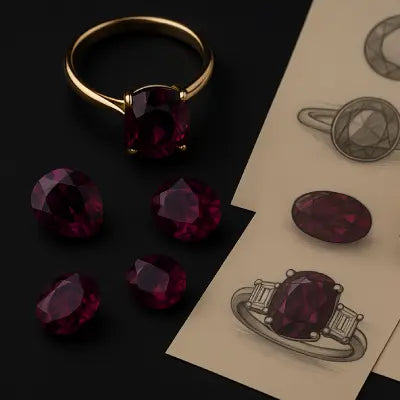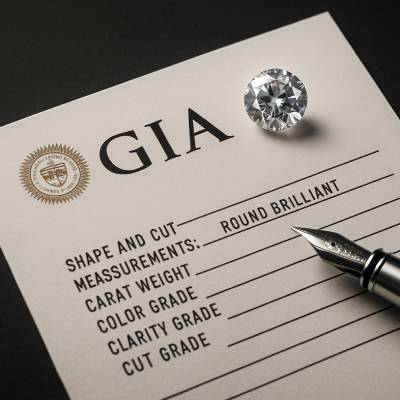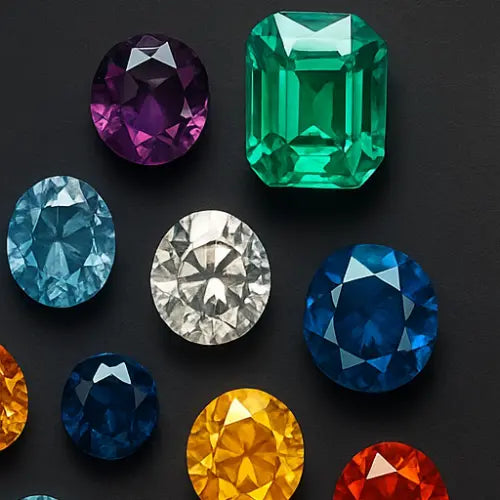In many families, it is customary to pass on jewelry from generations. It has a deep symbolic meaning. Such jewelry often comes with a mix of emotions. These pieces can carry deep sentimental value. What to do with inherited jewelry, whether you're in the San Francisco Bay Area or anywhere else, depends on various factors. They are your connection to the piece, financial worth, and style or needs. Some may treasure these items exactly as they are. Others may consider repurposing them into modern designs that align with their tastes. You might wonder if selling is the best option, especially if the jewelry doesn’t fit your lifestyle.
Deciding what to do with heirloom jewelry involves a thoughtful approach. Balancing your emotional attachment with practicality. You may choose to keep, repurpose, or sell the item. Your decision should honor the piece's history and your current needs. Here's some helpful guidance with important advice and essential tips. Your family jewelry can be treasured for generations to come. Let's explore your options.
Evaluating Your Inherited Jewelry
To decide what to do with heirlooms, it's essential to assess their sentimental, financial, and historical significance. Here's a step-by-step guide to help you evaluate its true value:
- Sentimental Value: Consider the personal and emotional attachment to the piece. Does it remind you of a loved one or represent family history? Sometimes, the emotional connection outweighs the financial worth.
- Financial Value: Are you curious about selling inherited jewelry? You’ll need a professional appraisal. Look for a certified appraiser. They specialize in jewelry to get an accurate assessment. They will evaluate the gold, silver, diamonds, craftsmanship, and the piece’s condition.
- Historical Significance: Some jewelry has unique historical or antique value. The piece may be old or from a particular era. Its rarity or craftsmanship might increase its worth.
- Consider Materials and Craftsmanship: These points can enhance the value of inherited jewelry. The type of gemstones, metal purity, and design contribute to its market appeal.
- Market Value: The current trends are crucial. Gold prices, demand for vintage pieces, and the popularity of specific gemstones fluctuate. They affect the resale value of your jewelry.
You should take these factors into account. So you’ll have a clearer idea of what to do with old rings or other inherited jewelry. Whether to keep, repurpose, or sell.
Preserving Family Heirlooms
Preserving your piece's quality and sentimental value is crucial if you're keeping your inherited jewelry as a family heirloom. There are some essential tips. They will help you to ensure these treasures last for future generations. Here are what to do with heirloom jewelry:
- Clean Regularly and Carefully: Clean up the jewelry with a soft cloth. You can also use a professional cleaning solution suitable for the materials. Avoid harsh chemicals that could damage gemstones or delicate metals.
- Store in a Safe Environment: Keep heirloom jewelry in a dry, cool place, away from direct sunlight. Use soft pouches, individual compartments in a jewelry box, or even airtight containers. They will help you to prevent scratches and tarnishing.
- Avoid Wearing Frequently: Wear family heirlooms only on special occasions rather than daily. Do it to reduce wear and tear.
- Get Regular Inspections: Have a jeweler check the pieces periodically. Ensure there are no loose stones, bent prongs, or other damage. This will ensure the jewelry stays intact over time.
Following these steps. You may wonder what to do with grandma's old jewelry. These steps will help you protect it for future generations to cherish.
Repurposing or Redesigning Inherited Jewelry
Your inherited jewelry may not fit your style. Repurposing or redesigning it offers a creative way to breathe new life into old pieces. Here are some innovative ideas for turning heirlooms into something you'll love:
- Transform Old Rings: Consider converting bands into new jewelry. You can turn the gemstones into a pendant, earrings, or a modern ring design. This is a perfect option if you're unsure what to do with jewelry you don't want. You can still wish to preserve its essence.
- Combine Multiple Pieces: You may inherit several items. Think about merging them into one stunning piece. For example, the stones from many rings could be set into a single statement necklace or bracelet.
- Redesign with Modern Elements: Update the style of an antique piece. Change its setting or add contemporary design features. These can be unique engraving or mixed metals.
- Create Custom Pieces: Collaborate with a jeweler to design something entirely new. Use the materials from the original jewelry, ensuring a unique, personal touch.
Redesigning offers a meaningful way to explore things to do with old jewelry. It allows you to honor the past while embracing your current style.
Selling Inherited Jewelry: What You Need to Know
Understanding the process and finding a reputable buyer is crucial. You should do it if you decide to part with your inherited jewelry. There are vital steps when figuring out how to sell inherited jewelry and ensuring you get a fair deal. Let's explore them:
- Get a Professional Appraisal: A certified jeweler or gemologist evaluates the jewelry. It will help to determine its fair market value before selling. This will help you understand the worth. It is based on materials, craftsmanship, and market trends.
- Compare Offers: Shop around and get multiple offers to ensure you receive a fair price. Don't rush the process. Taking time to compare offers will give you a better sense of the jewelry's market value.
- Research Reputable Buyers: Are you looking for the best way to sell inherited jewelry? Finding trustworthy buyers is essential. Many local jewelers buy estate jewelry, offering convenience and professional guidance. For rare or antique pieces, auction houses can attract high-end buyers. They potentially drive up the price. eBay or specialized jewelry sites allow you to sell directly to consumers. You’ll need to manage the listing, communication, and transaction yourself.
- Understand the Sales Process: You may be typically offered a wholesale price when selling to a jeweler. This is normally lower than retail. Auctions might charge a commission, so be aware of the fees involved. Selling online gives you more control. It also requires effort in listing, shipping, and handling negotiations.
Carefully navigate the selling process to find the best way to sell inherited jewelry. This is while ensuring you receive a fair price for your treasured items.

What to Do With Inherited Wedding Rings
Inheriting marriage bands carries a unique sentimental significance. They symbolize love, commitment, and family legacy. Deciding what to do with inherited marriage rings can be a personal choice. Emotional and practical considerations influence it. There are some things to do with old jewelry. Let's explore them:
- Keep and Cherish: Many people store rings as cherished family heirlooms. You can keep them in a safe place and wear them as is. You can pass them down to future generations as part of your family’s story.
- Repurpose or Redesign: The ring's design doesn’t suit your taste or lifestyle. Consider redesigning it. Options are turning it into a new wedding band or other meaningful jewelry. It can be a pendant or bracelet. This allows you to honor its legacy while adapting it to your style.
- Selling Inherited Jewelry: You may decide the ring no longer fits your needs. Selling is another option. It must be appraised to determine its fair market value before doing so. You can sell through a reputable jeweler, auction house, or online marketplace. Be mindful of its history and value beyond just the monetary aspect. Do it when selling inherited jewelry.
- Preserve Its Sentimental Value: Transferring a ring to a child or grandchild after the wedding. This is a beautiful way to continue a family tradition. Another option is to combine it with your partner’s ring to create a new, custom wedding set.
You should understand what to do with inherited wedding rings. This is whatever your decision. It ensures you honor these meaningful pieces' emotional and financial aspects.
Making a Decision, That’s Right for You
You can face the question of what to do with heirlooms. Make a decision that aligns with your values, financial needs, and emotional attachment. Here are some steps to guide you in making the right choice:
- Assess Emotional Attachment: Reflect on the sentimental value of the jewelry. Consider whether the piece holds significant personal or family meaning. You might lean towards keeping or repurposing it to preserve its legacy if it does.
- Evaluate Financial Needs: Determine if selling the jewelry could address any immediate ones. You must understand what to do with old rings if you sell. Get a professional appraisal. Exploring various selling options will help you make an informed decision.
- Consult Family Members: Discuss your options with those with emotional ties to the jewelry. Their input can provide valuable perspectives. They will help you make a decision that respects family traditions and sentiments.
- Seek Professional Advice: If unsure, consider consulting a financial advisor. Also, you can talk with the jeweler. They can offer insights on the market value, potential design changes, or the best way to handle the piece.
- Take Your Time: Don’t rush your decision. Weigh the pros and cons of each option. It is keeping, repurposing, or selling. Take the time to consider your choices thoroughly. It will ensure you make a decision that feels right for you.






